Phone:
(701)814-6992
Physical address:
6296 Donnelly Plaza
Ratkeville, Bahamas.
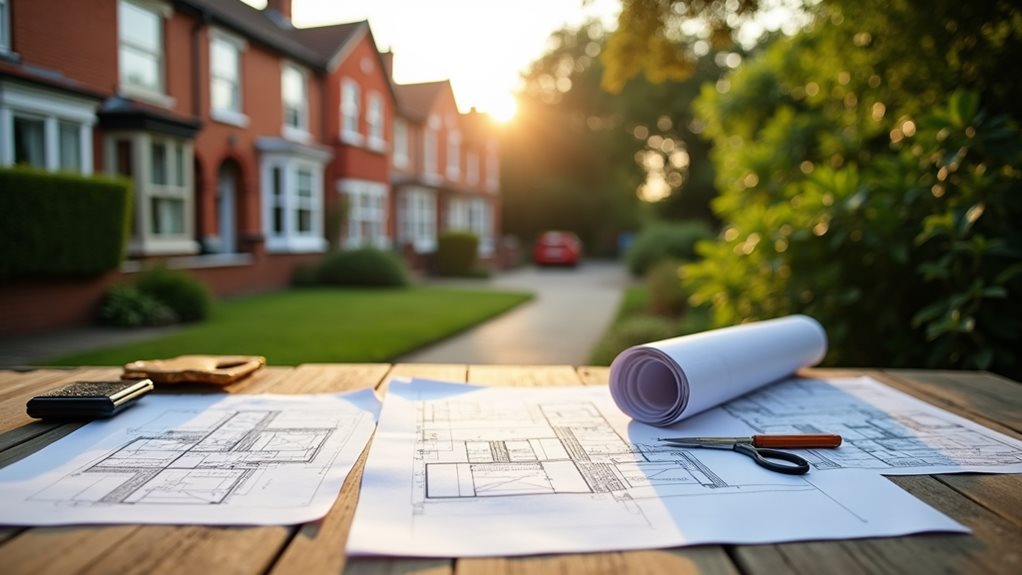
You must consider vital elements before starting your home extension in Manchester—discover what could make or break your project.
Before you commence on a home extension in Manchester, it's essential to evaluate several key factors. Start with your budget—extensions can vary greatly in cost. Next, think about your design preferences, ensuring they blend with your home's character and neighborhood style. Don't forget to check legal requirements like zoning regulations and planning permissions, as these can affect your project timelines. Selecting a qualified contractor is important for a smooth build. Finally, consider how the extension might impact your neighborhood and your future needs. If you keep these aspects in mind, you'll pave the way for a successful extension journey.
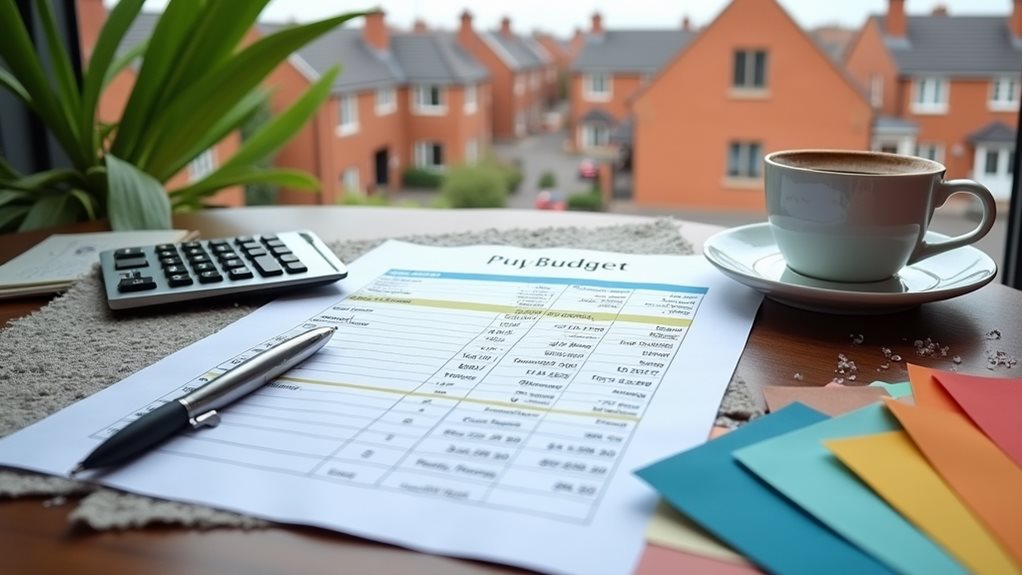
Budget planning is essential when considering a home extension in Manchester. As you initiate this journey, getting a solid grasp on cost estimation can make all the difference.
Typically, extensions range from £1,500 to £2,500 per square meter, with the size of your property, chosen materials, and type of extension influencing the final price. For instance, a single-storey bedroom extension might set you back between £16,000 and £70,000. Additionally, engaging with experienced local builders can ensure you navigate these costs effectively.
It's wise to use a house extension cost calculator, which can help you generate a realistic budget based on your unique situation. Additionally, considering a single-storey extension can be 50% cheaper than a double-storey option, making it a favorable choice for many homeowners.
Don't forget to gather multiple quotes from contractors, allowing you to track expenses effectively and avoid any unpleasant surprises down the line.
Prioritize verifying your budget early on to enhance budget tracking and prevent overspending, as changes made during construction can spike costs.
Having a contingency fund guarantees you're ready for unexpected expenses, providing peace of mind.
Once you've tackled budget planning, it's time to focus on design preferences that will bring your vision to life. Your extension shouldn't just add space; it should enhance the character of your property and seamlessly integrate with its existing architectural style.
Think about how your design choices reflect your personal aesthetics while honoring the tradition of your home and neighborhood. Start by considering various design styles that resonate with you. Whether you're drawn to contemporary clean lines or classic Victorian details, ensuring your extension complements the main dwelling is essential.
Pay attention to material choices as well; durable materials that match your property will enhance its appeal and longevity. Reflect on elements like roof design, window styles, and brick detailing to create a unified look. Moreover, remember that choosing materials wisely can contribute to the overall value increase of your property, making it a more worthwhile investment.
Finally, remember the importance of proportion. Your extension should enhance the original property without overshadowing it. Keep in mind sustainable design principles, too, as incorporating eco-friendly features can elevate your project.
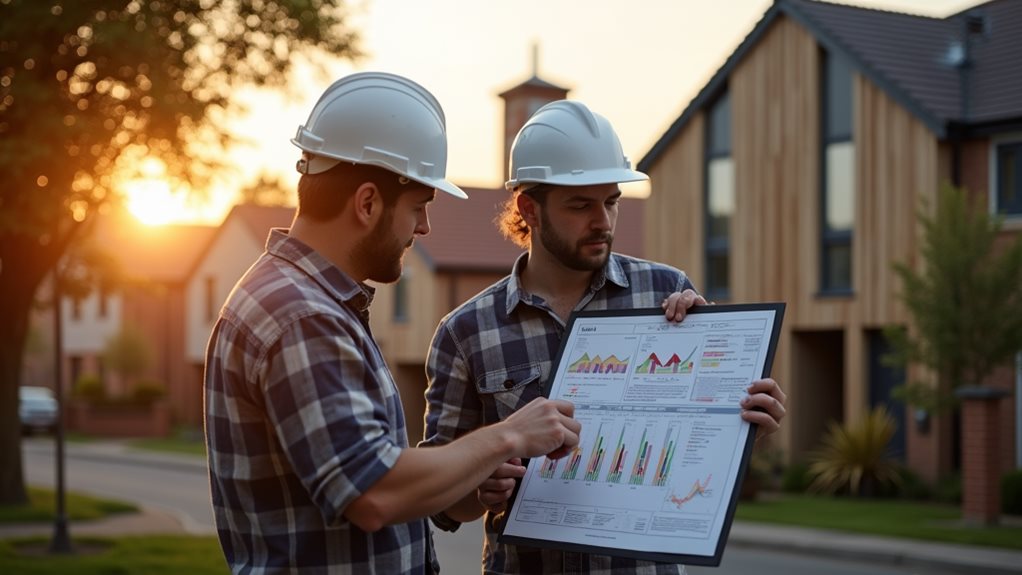
When you start planning your home extension, it's vital to have a clear timeline in mind.
The process kicks off with an essential feasibility study and design development, which typically takes a few weeks, followed by contractor selection.
Once construction begins, the type of extension you choose will dictate how long you'll be living in a work zone, so knowing these timelines can help you prepare.
Maneuvering the planning process for a home extension in Manchester involves a series of steps that can vary in duration, depending on several factors.
You'll start with the validation period, which typically takes 1-2 weeks. This initial phase guarantees you provide all necessary information, helping you dodge potential timeline challenges down the road.
Next comes the public consultation, usually lasting 3-4 weeks. This stage invites local input, allowing your neighbors to voice their opinions and possibly raise concerns. While this can foster community ties, it may also extend your timeline if objections arise.
Then, you enter the assessment and decision phase, which often spans 8-13 weeks. During this period, the local planning authority evaluates your proposal deeply, and complex issues can result in further delays.
Building a home extension often requires careful planning and a clear timeline. When you initiate this journey, knowing the construction phases is essential to staying on track and minimizing potential project delays.
Typically, a single-storey extension can take about 2-3 months, while a double-storey will stretch to around 3-4 months. Here's a quick overview of what to expect:
Keep in mind that factors like complexity, materials, and weather can influence your timeline.
By working closely with experienced builders, you can navigate these construction phases more smoothly, allowing for regular updates and adjustments as needed.
Choosing the right contractor for your home extension in Manchester can greatly influence the project's success. To guarantee you're making a wise choice, start by evaluating contractor qualifications.
Look for someone with a solid portfolio of past projects, specifically in house extensions. This experience shows they can handle the planning permissions and structural changes your project may need.
Check their technical expertise, as they should be knowledgeable in plumbing, electrical work, and roofing too.
Don't forget to verify that they've all the necessary licenses and relevant certifications from recognized associations like the Federation of Master Builders.
Communication is key in project management, so select a contractor who's responsive and clear about costs and timelines.
Reading online reviews and seeking recommendations from friends or family can provide insight into their reputation and reliability.
When you meet with potential contractors, ask for detailed estimates and discuss their past client experiences.
A contractor who understands Manchester's specific construction nuances can also offer tailored solutions that suit your needs.
Trust your instincts; a reliable contractor can make your dream extension a delightful reality.
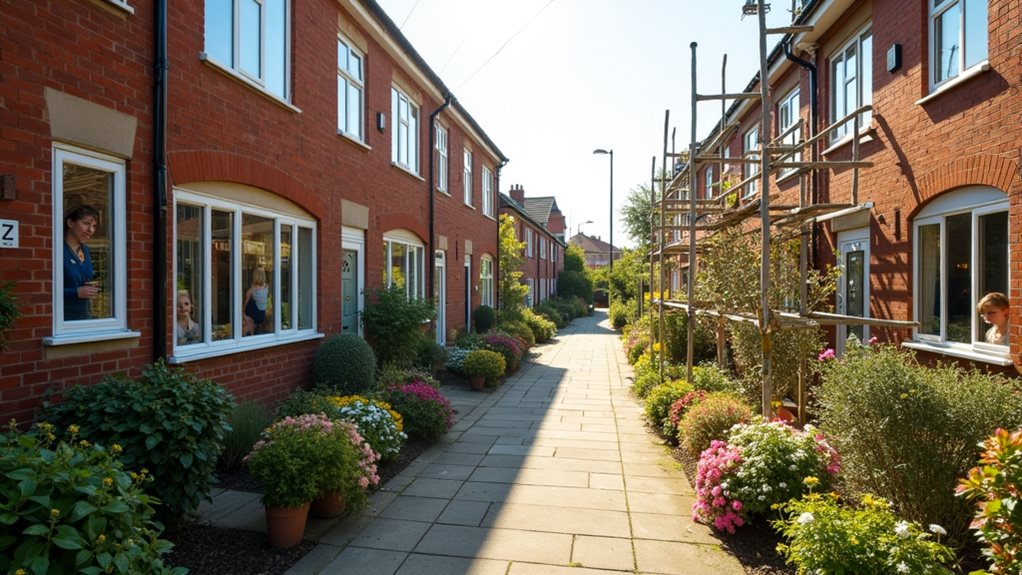
When considering a home extension in Manchester, it's crucial to understand how your project can impact the neighborhood.
To guarantee your extension fits seamlessly into the community, keep these key factors in mind:
When you're planning a home extension in Manchester, understanding legal considerations is essential.
You'll need to navigate permitted development rights, local authority regulations, and any specific restrictions, like those under Article 4 directions.
Being aware of these elements not only helps you avoid potential legal pitfalls but also guarantees your extension goes smoothly and aligns with local standards.
Understanding permitted development rights is essential for homeowners looking to extend their properties in Manchester. These rules can save you the hassle of needing full planning permission if your project meets specific criteria.
Let's break it down:
Before you plunge into your exciting extension plans, check your extension eligibility. If your property is a flat, maisonette, or listed building, you might face restrictions.
Understanding these legal aspects will guide you in making informed decisions, assuring your home extension aligns seamlessly with both your vision and the regulations.
Maneuvering the complexities of Article 4 Directions is essential for homeowners in Manchester considering an extension. These legal tools can greatly affect your plans, as they remove or restrict permitted development rights in designated areas.
Understanding the Article 4 implications is important because it directly impacts what alterations you can make without needing full planning permission.
Before jumping into your extension project, it's wise to check if your area is subject to an Article 4 Direction. Many homeowners overlook this step, which can lead to unexpected delays and costs. The process usually involves local authority consultation, allowing you to voice your thoughts and concerns. This is your chance to engage with the community about preserving the character and integrity of your neighborhood.
Once you know the rules, seeking professional advice becomes essential. Managing the legal processes can be tricky, and a planner can help guarantee you meet all necessary regulations.
Steering through local authority regulations is key to a successful home extension in Manchester.
You'll want to grasp the planning application process and its associated requirements to avoid any legal hiccups down the line. Here are a few essential points to keep in mind:
Additionally, always guarantee compliance with building regulations—it's non-negotiable.
Structure, fire safety, and energy efficiency standards must all be met.
Remember, obtaining all approvals before construction can smooth the process and minimize disputes.
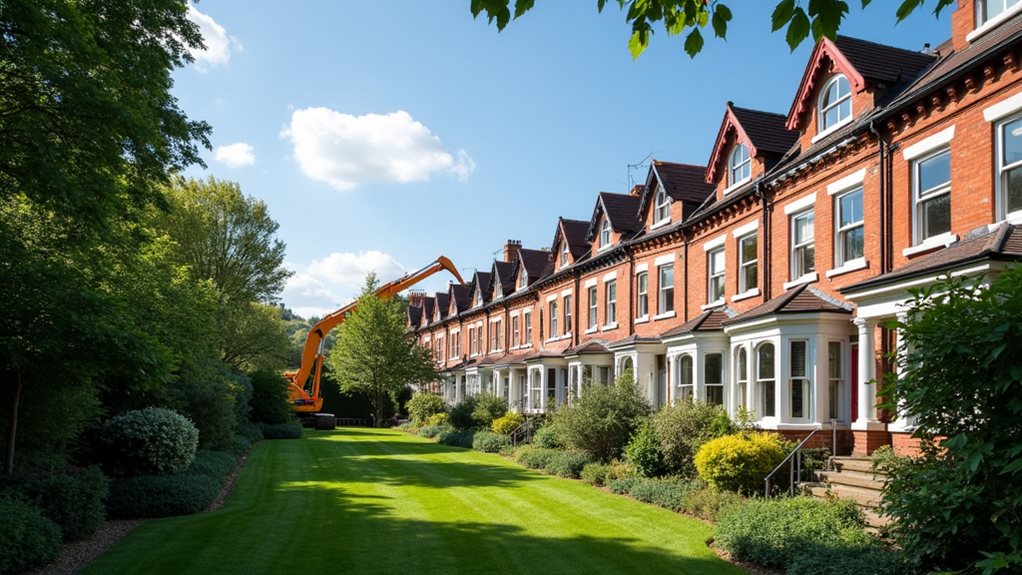
Property value is intricately tied to various factors that can greatly influence a homeowner's investment after extending their property. Understanding how property demand and buyer preferences impact value is fundamental, especially in a vibrant market like Manchester.
Locations with strong demand often see a more pronounced appreciation in value after an extension, particularly if the area boasts amenities, good transport links, and an appealing neighborhood culture.
The type and quality of your extension also play essential roles. A thoughtfully designed extension—be it a single-storey addition or a loft conversion—can enhance functionality and aesthetic appeal, meeting what buyers desire today.
Extensions offering larger kitchens or home offices can tap into current buyer preferences, making your property more desirable.
Moreover, conducting a cost analysis is critical. You'll want to verify that the cost of your project aligns with the potential increase in value.
When planning a home extension, it's important to think about future needs and flexibility. You want a space that adapts to your family's evolving lifestyle. By anticipating changes, you'll guarantee your home remains functional and welcoming for years to come.
Here are some key considerations:
Deciding to extend your home in Manchester's no small feat—it could feel like climbing Everest! However, by evaluating your budget, design preferences, timeline, and more, you'll pave the way for a smoother process. Remember, considering your contractor's credentials and the impact on your neighborhood is vital too. With careful planning, you can create a space that meets your current needs and adapts for the future, making your home even more of a treasure.